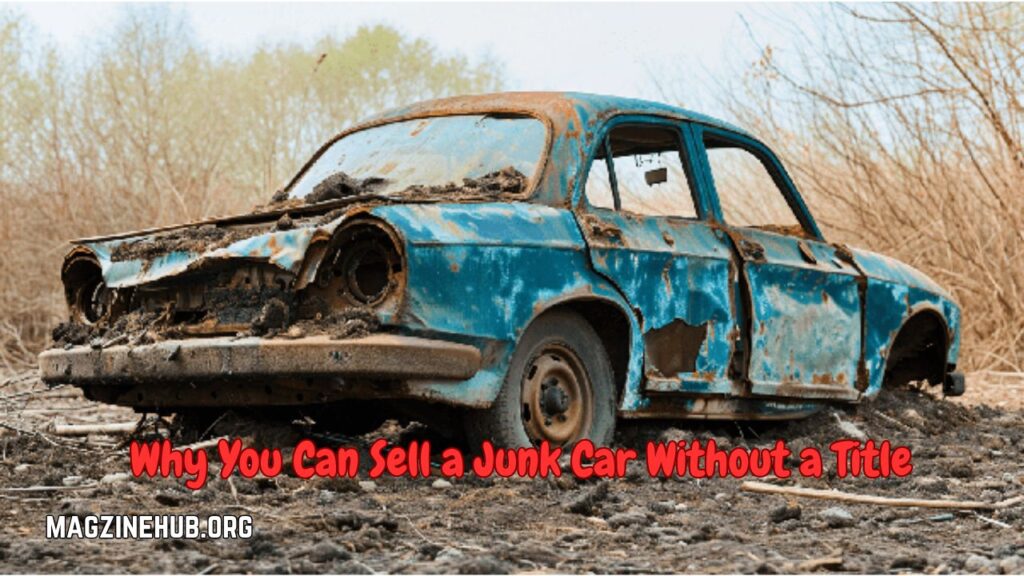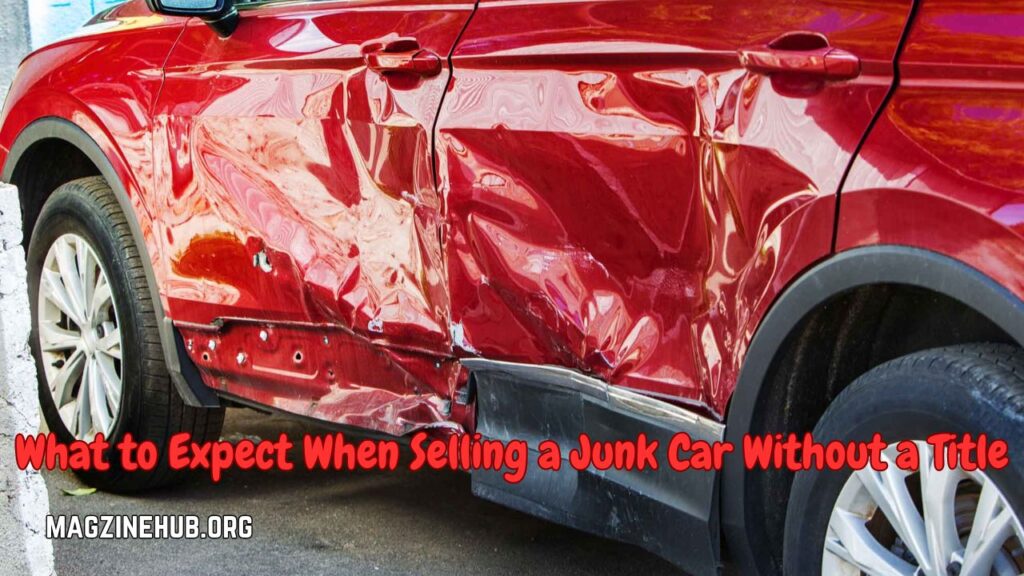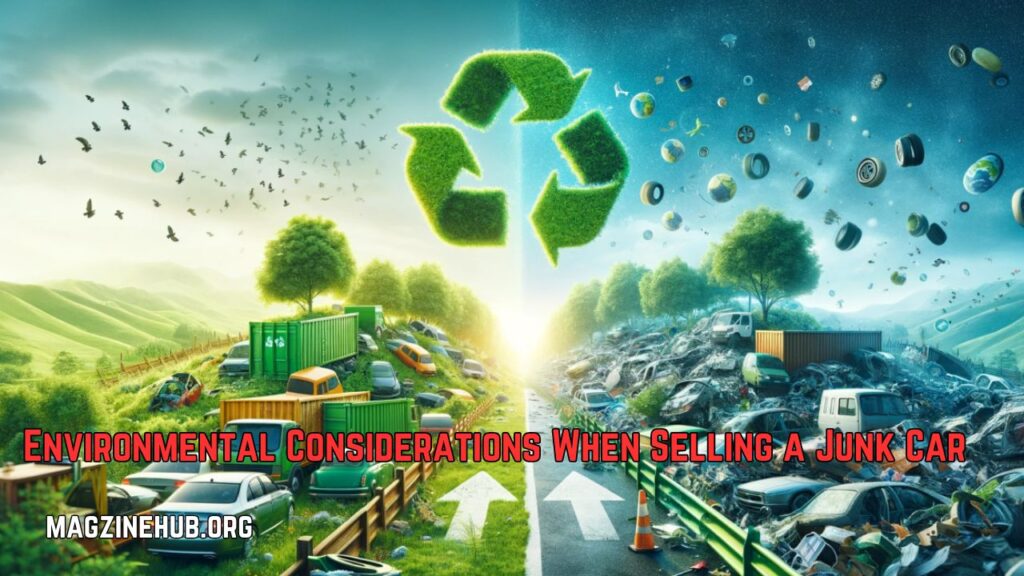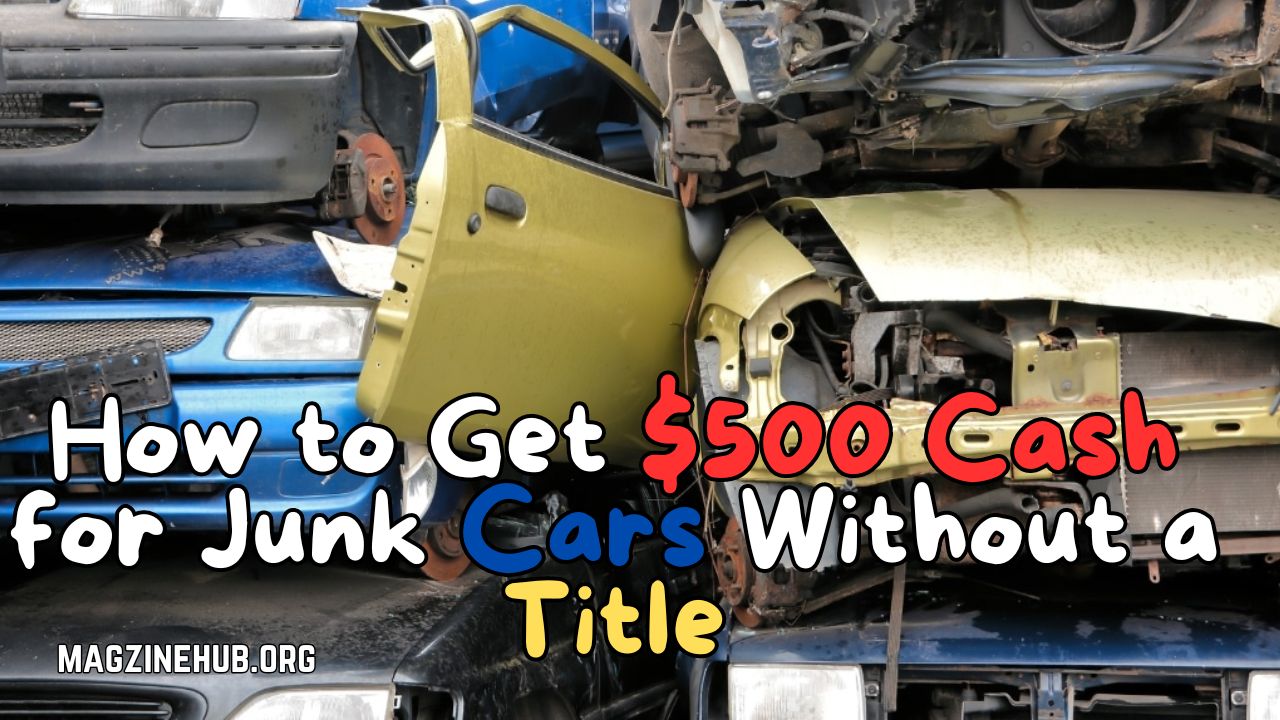How to Get $500 Cash for Junk Cars Without a Title: A Comprehensive Guide
Get up to $500 cash for your junk car without a title! Learn how to navigate legal requirements, maximize your offer, and choose eco-friendly buyers. Expert tips and real examples to ensure a smooth and profitable sale.
Are you stuck with an old, non-operational car sitting on your property, collecting rust and taking up space? Perhaps you’ve misplaced the title, or maybe you never had it in the first place. The good news is that you can still turn that eyesore into cash—up to $500 or more. This comprehensive guide will take you through every step of selling your junk car without a title, ensuring you get the best deal while staying within legal boundaries.
In this guide, you’ll learn:
- Understanding the Value of Your Junk Car
- Why You Can Sell a Junk Car Without a Title
- How to Find the Best Junk Car Buyer
- What to Expect When Selling a Junk Car Without a Title
- Tips for Maximizing Your Cash Offer
- Legal Considerations When Selling a Junk Car Without a Title
- Common Challenges and How to Overcome Them
- Success Stories: Real-Life Examples of Profitable Junk Car Sales
- Environmental Impact: How Selling Your Junk Car Helps the Planet
- Conclusion: Turning Trash into Treasure
1. Understanding the Value of Your Junk Car
Before you dive into selling your junk car, it’s crucial to understand its value. Junk cars can be surprisingly valuable, depending on various factors. This section will break down these factors, helping you grasp how much money you can realistically expect.
1.1 Make and Model: The Brand’s Impact on Value
Not all junk cars are created equal. Some makes and models are more sought after than others due to their parts’ demand or the materials they’re built from. For instance, certain brands like Honda, Toyota, or Ford have high demand in the second-hand parts market because they are widely used and their parts are relatively easy to sell.
Case Study: The Value of a Junk Toyota Corolla vs. a Cadillac DeVille
Let’s compare two examples: a 2000 Toyota Corolla and a 1995 Cadillac DeVille. The Toyota Corolla, despite being a compact car, can fetch a good price in the junk market due to the high demand for its parts. On the other hand, the Cadillac DeVille, being older and more specialized, might be more valuable for its scrap metal, given its larger size and weight.
- Toyota Corolla: High demand for parts, lightweight, average scrap value.
- Cadillac DeVille: Lower demand for parts, heavy, higher scrap value.
These nuances can mean the difference between a few hundred dollars and closer to $500.
1.2 Condition: Why Even Non-Operational Cars Have Value
The condition of your junk car significantly impacts its value. However, even cars that don’t run can be worth a considerable amount.
- Operational Status: A car that still runs, even if poorly, is usually worth more because it may be repairable.
- Exterior and Interior Condition: Dented or rusted bodywork and torn interiors can decrease the value, but some buyers focus only on the car’s scrap metal and parts.
- Missing Parts: If your car is missing essential components like the engine or transmission, its value might be lower. However, valuable parts such as a catalytic converter or an alternator can still boost your offer.
Example: A Rusty but Valuable 1998 Honda Accord
Even if your 1998 Honda Accord is heavily rusted and doesn’t start, it could still fetch a decent price. Parts like the catalytic converter, which contains precious metals like platinum, rhodium, and palladium, are particularly valuable. In some cases, these parts alone can be worth $200 or more.
1.3 Weight: How Scrap Metal Prices Influence Offers
Scrap metal is often sold by weight, so the heavier your car, the more it could be worth. The type of metal also matters:
- Steel: Common in most cars, it’s not as valuable as aluminum or copper but still adds up, especially in heavier vehicles.
- Aluminum: Found in parts like wheels and engine blocks, it’s worth more per pound than steel.
- Copper: Primarily found in the wiring and some components, it’s the most valuable metal in your junk car.
Quick Calculation: Estimating Scrap Value by Weight
To give a rough idea, let’s calculate the potential scrap value:
- Car Weight: 3,000 pounds
- Scrap Steel Price (per ton): $150
- Estimated Scrap Value: (3,000 lbs / 2,000 lbs) * $150 = $225
This is a simplified example, but it illustrates how scrap metal prices play a role in determining your car’s value.
1.4 Location: How Geography Affects Junk Car Prices
Your location can also influence the price you get for your junk car. Factors such as the local demand for parts, proximity to scrap yards, and regional scrap metal prices all play a part.
- Urban Areas: Typically have higher demand for parts and better access to junk car buyers, potentially leading to higher offers.
- Rural Areas: Might offer lower prices due to fewer buyers and higher transportation costs, but if a local junkyard needs specific parts, you could get lucky.
Example: Comparing Prices in Different Cities
Imagine you’re in New York City versus a small town in rural Kansas. In New York, the high demand for parts and numerous buyers might mean a higher offer, while in rural Kansas, you might struggle to get top dollar due to limited demand and fewer buyers.
2. Why You Can Sell a Junk Car Without a Title

Selling a junk car without a title is a common concern, but it’s more manageable than you might think. Understanding why and how it’s possible will give you confidence and open up your selling options.
2.1 Common Reasons for Missing Titles
There are several reasons why you might not have a title for your junk car:
- Lost Title: Titles can easily be misplaced, especially if the car hasn’t been driven or registered in years.
- Inherited Car: Sometimes, vehicles inherited from family members don’t come with the title, particularly if the car was off the road.
- Abandoned Vehicle: If you purchased or were given an abandoned vehicle, the title might not have been transferred to you.
Real-Life Example: John’s Inherited 1987 Chevy Camaro
John inherited a 1987 Chevy Camaro from his uncle, but the title was never found. Despite this, he was able to sell the car to a junkyard that specialized in vehicles without titles. The junkyard verified the vehicle’s status and John’s relationship to the previous owner before proceeding with the sale.
2.2 Why Junk Car Buyers Accept Cars Without Titles
Junk car buyers are often willing to purchase vehicles without titles for several reasons:
- Parting Out the Car: Buyers often dismantle the car for parts, which can be sold individually without needing a title.
- Scrap Metal: The car can be sold for its scrap metal content, where the title is less critical.
- Experience with Title Issues: Many junkyards and buyers have processes in place to deal with title issues, sometimes even helping you obtain a duplicate title.
Case Study: How Junk Yards Handle Title-Less Cars
Many junkyards have systems in place for buying cars without titles. For instance, Junk Car Jack’s in Florida handles title-less cars by requiring the seller to sign a statement of ownership and provide proof of identity. They then process the car for parts or scrap metal, where a title is not necessary.
2.3 States Where Selling a Car Without a Title is Easier
Laws regarding selling a car without a title vary by state. In some states, it’s relatively easy, while in others, the process can be more complicated.
- States with Lenient Laws: Florida, Texas, and California often have more straightforward processes for selling cars without titles, especially if the car is over a certain age or the owner can provide other proof of ownership.
- States with Strict Laws: New York and Massachusetts are known for having stricter rules, often requiring a duplicate title or more extensive paperwork.
Legal Insight: Selling Without a Title in Florida
In Florida, you can sell a car without a title if the vehicle is over 10 years old, not subject to any liens, and you have proof of ownership, such as a bill of sale. This makes it easier for owners to offload junk cars quickly.
3. How to Find the Best Junk Car Buyer
Finding the right buyer is crucial to getting the most cash for your junk car, especially when you don’t have a title. This section will guide you through the process of locating, evaluating, and negotiating with potential buyers.
3.1 Where to Search for Junk Car Buyers
Finding a reliable buyer begins with knowing where to look. Here are some of the best places to start your search:
- Online Marketplaces: Websites like Craigslist, Facebook Marketplace, and specialized junk car buying sites are excellent places to find buyers.
- Local Junkyards: Many junkyards are willing to purchase cars without titles, and they often offer towing services.
- Auto Salvage Yards: These businesses focus on dismantling vehicles and selling parts, making them good candidates for buying junk cars.
- Referrals: Ask friends, family, or mechanics for recommendations. Personal referrals can lead to trustworthy buyers.
Example: Using Facebook Marketplace to Find a Buyer
Imagine you list your old car on Facebook Marketplace with a brief description of its condition and the fact that you don’t have the title. Within hours, you might receive multiple offers from interested buyers. Comparing these offers gives you the leverage to negotiate a better deal.
3.2 Evaluating Potential Buyers
Not all buyers are created equal. It’s essential to evaluate potential buyers carefully to ensure you’re dealing with a legitimate, fair, and reliable buyer.
- Check Reviews: Look up the buyer or company online to read reviews. Google, Yelp, and the Better Business Bureau (BBB) are good places to start.
- Ask for Credentials: Legitimate buyers should be willing to provide proof of business credentials, such as licenses or certifications.
- Compare Offers: Don’t settle for the first offer you receive. Getting multiple quotes can help you understand the market and negotiate better terms.
- Inquire About Towing: Some buyers offer free towing services, which can save you money. Always ask if towing is included in their offer.
Warning Signs: How to Spot a Shady Buyer
Be wary of buyers who:
- Pressure you to make a quick decision.
- Offer cash but refuse to put anything in writing.
- Avoid answering questions about their business credentials or process.
3.3 How to Get Multiple Quotes
The best way to maximize your cash offer is by getting multiple quotes. Here’s how to efficiently gather and compare offers:
- Online Quote Tools: Many junk car buyers offer instant online quotes based on basic information like make, model, year, and condition.
- Phone Calls: Calling junkyards directly allows you to ask specific questions and get a feel for their customer service.
- Email Inquiries: Sending an email with details about your car can result in written offers, which are useful for documentation and comparison.
Strategy: Using Online Tools to Get the Best Offer
Start by using an online quote tool to get a baseline offer for your car. Then, call or email other buyers to see if they can beat it. This not only ensures you get the best price but also gives you a solid understanding of your car’s value in the current market.
3.4 Negotiating the Best Price
Negotiation is key to maximizing the cash you receive for your junk car. Here are some tips to help you negotiate effectively:
- Know Your Car’s Value: Use the information gathered in the previous sections to understand your car’s worth.
- Be Honest: Describe your car’s condition accurately. Honesty builds trust and can lead to better offers.
- Leverage Multiple Offers: If one buyer offers $400 and another offers $450, use the higher offer to negotiate a better deal with the first buyer.
- Don’t Be Afraid to Walk Away: If a buyer’s offer seems too low, be prepared to walk away. There are plenty of buyers out there.
Example: How Jane Negotiated $100 More for Her Junk Car
Jane received an initial offer of $300 for her junk car. However, she knew her car was worth more based on her research. She contacted another buyer who offered $350. Jane then went back to the first buyer and told them about the higher offer. They matched the $350 and even offered free towing, making the deal more attractive.
3.5 Finalizing the Deal
Once you’ve chosen a buyer and agreed on a price, it’s time to finalize the deal. Here’s what to expect:
- Paperwork: Even without a title, some paperwork is usually involved. The buyer may provide a bill of sale or a statement of ownership.
- Payment: Ensure you agree on the payment method—cash is often preferred, but checks and electronic transfers are also common.
- Towing: Arrange for the car to be towed. If the buyer offers free towing, confirm the pickup time and location.
- Liability Release: Don’t forget to complete a liability release form to protect yourself from any future legal issues related to the car.
Checklist: Steps to Finalizing Your Junk Car Sale
- Review the Bill of Sale: Make sure all details are accurate.
- Verify Payment Method: Confirm how and when you’ll receive payment.
- Arrange Towing: Set up the logistics for the car’s removal.
- Complete Liability Release: Submit this to your state’s DMV or relevant authority.
4. What to Expect When Selling a Junk Car Without a Title

Selling a junk car without a title can differ from a standard car sale. Understanding what to expect can help you navigate the process smoothly.
4.1 Proof of Ownership: Alternatives to a Title
While the title is the most common proof of ownership, there are alternatives you can use to prove that the car is yours:
- Registration: If you have an up-to-date registration, it can serve as proof of ownership.
- Bill of Sale: A bill of sale from when you originally purchased the vehicle can also be useful.
- Insurance Documentation: Sometimes, insurance documents that show your name and the vehicle’s details can help establish ownership.
Example: Mark’s Sale with Only a Registration
Mark lost his car title years ago, but he still had the car’s registration. He was able to use the registration to prove ownership when selling his car to a local junkyard. The junkyard accepted the registration as sufficient proof and completed the purchase.
4.2 Identity Verification: Ensuring a Legitimate Sale
To protect both parties, buyers will often ask for identity verification. Here’s what you might need to provide:
- Driver’s License: A standard form of ID that confirms your identity.
- Utility Bill: Sometimes used to verify your address, especially if you don’t have a title.
- Social Security Number: Rarely required, but some buyers may ask for it in states with stricter regulations.
Real-Life Example: Identity Verification in California
In California, when John sold his junk car without a title, the buyer asked for his driver’s license and a recent utility bill. This helped establish that John was the legitimate owner and that the sale was above board.
4.3 Paperwork Involved in Title-Less Sales
While selling a car without a title involves less paperwork, there are still a few forms you might need to fill out:
- Statement of Ownership: Some buyers require a signed statement confirming that you are the rightful owner.
- Bill of Sale: It’s advisable to provide or request a bill of sale, detailing the transaction and protecting both parties legally.
- Affidavit: In some states, an affidavit may be required, especially if the car is over a certain age or if the title is lost.
Example: Selling a Car Without a Title in Texas
In Texas, Bill had to fill out an affidavit of fact, stating that he had lost the title but was the rightful owner of the car. The affidavit, combined with his ID and the car’s registration, was enough for the buyer to proceed with the purchase.
4.4 Timeframes: How Long the Process Takes
The process of selling a junk car without a title can take a bit longer than a standard sale. Here’s what to expect in terms of timing:
- Initial Contact: Reaching out to buyers and gathering quotes can take 1-3 days.
- Documentation: Preparing any necessary paperwork, like proof of ownership or an affidavit, can add another day or two.
- Sale Completion: Once everything is in place, the actual sale and towing can often be completed within 1-2 days.
Quick Timeline: Selling a Junk Car Without a Title in a Week
- Day 1-2: Research and contact potential buyers.
- Day 3: Prepare any needed documents and verify ownership.
- Day 4-5: Negotiate and finalize the deal.
- Day 6-7: Complete the sale, arrange towing, and transfer ownership.
5. Tips for Maximizing Your Cash Offer
Getting the most money for your junk car, especially without a title, requires strategy and a bit of effort. This section provides advanced tips to help you squeeze every last dollar out of your junk car.
5.1 Remove Valuable Parts Before Selling
Some parts of your car may be more valuable when sold separately than if included in the sale of the entire vehicle. Here are some parts to consider removing:
- Catalytic Converter: As mentioned earlier, catalytic converters contain precious metals that can be sold for a significant amount.
- Battery: Car batteries are often worth $10-$20 at a scrap yard or can be sold to auto parts stores.
- Tires and Rims: If your tires are in good condition, they can be sold separately. Alloy rims also have a high resale value.
- Stereo System: If your car has an aftermarket stereo or sound system, consider removing it to sell separately.
Example: How Chris Made an Extra $200 by Selling Parts Separately
Chris decided to remove the catalytic converter and stereo system from his junk car before selling it. He sold the catalytic converter for $150 and the stereo system for $50 on eBay. This extra effort added $200 to his total earnings from the car.
5.2 Clean the Car: First Impressions Matter
Even though you’re selling a junk car, first impressions can make a difference. A clean car suggests to the buyer that the vehicle has been well-maintained, which can lead to a higher offer.
- Exterior Wash: Give the car a quick wash to remove dirt, grime, and rust spots.
- Interior Vacuum: Clean out any trash and vacuum the seats and floor mats.
- Remove Personal Items: Ensure that you’ve removed all personal belongings from the car.
Example: How a Quick Cleanup Earned Susan an Extra $50
Susan’s junk car had been sitting in her driveway for years, covered in dirt and debris. Before selling it, she gave it a quick wash and vacuumed the interior. The buyer was impressed with the car’s condition and offered her $50 more than the original quote.
5.3 Be Honest About Your Car’s Condition
Honesty is the best policy when selling a junk car, especially without a title. Misrepresenting your car’s condition can lead to lower offers or even the buyer backing out at the last minute.
- Provide Accurate Details: When describing your car, mention all known issues, including those related to the engine, transmission, and body.
- Disclose Missing Parts: If the car is missing any major components, such as the engine or transmission, disclose this upfront.
- Offer Photos: Providing clear photos of your car from multiple angles can help build trust and lead to better offers.
Example: How Honesty Paid Off for Mike
Mike was upfront about his junk car’s condition when selling it. He disclosed that the car had a blown head gasket and a missing transmission. The buyer appreciated his honesty and offered him $50 more than the initial quote, knowing they wouldn’t encounter any surprises.
5.4 Consider Seasonal Demand: Timing Can Boost Your Offer
Believe it or not, the time of year can impact how much you can get for your junk car. Certain times of the year see higher demand for specific parts or scrap metal.
- Winter: During winter, parts related to heating and starting systems (like batteries and alternators) are in higher demand.
- Summer: In summer, parts related to air conditioning systems may fetch a higher price.
- Metal Prices: Scrap metal prices fluctuate throughout the year, so monitoring these prices can help you sell at the right time.
Example: How Seasonal Timing Helped Lisa Get an Extra $100
Lisa waited until winter to sell her junk car, knowing that its new battery and heating system components would be in higher demand. As a result, she received $100 more than she would have if she had sold the car in the summer.
5.5 Document Everything: Protect Yourself and Your Investment
Documenting every step of the process protects you from potential legal issues and ensures you receive full payment.
- Keep Records: Save copies of all emails, texts, and paperwork related to the sale.
- Get a Receipt: Make sure to get a receipt from the buyer, detailing the transaction amount and the vehicle’s VIN.
- Submit a Release of Liability: File a release of liability with your state’s DMV to avoid future legal issues related to the car.
Example: How Documentation Saved Jeff from a Legal Headache
Jeff sold his junk car without a title and kept meticulous records of the entire transaction. A month later, he received a notice about unpaid parking tickets from the car’s new owner. Fortunately, Jeff had submitted a release of liability and kept all his records, allowing him to prove he was no longer responsible for the car.
6. Legal Considerations When Selling a Junk Car Without a Title

Understanding the legal implications of selling a junk car without a title is crucial to ensure the process goes smoothly and you avoid any legal pitfalls.
6.1 Understanding State Laws: What You Need to Know
Each state has different laws regarding the sale of vehicles without titles. Some states have lenient regulations, while others have strict requirements.
- Lenient States: In states like California, Florida, and Texas, you can sell a junk car without a title if you can provide proof of ownership, such as a registration or bill of sale.
- Strict States: States like New York and Massachusetts have stricter laws that may require a duplicate title or more extensive paperwork.
Legal Example: Selling a Junk Car Without a Title in California
In California, if you don’t have a title, you can still sell your junk car if it’s over 10 years old and you provide a bill of sale and other proof of ownership. This makes it easier to get rid of old, non-operational vehicles.
6.2 How to Obtain a Duplicate Title
If you’ve lost your title but want to avoid the complications of selling without one, you can apply for a duplicate title. Here’s how:
- Visit Your Local DMV: Most DMVs allow you to apply for a duplicate title in person or online.
- Provide Proof of Ownership: You’ll need to provide identification and proof of ownership, such as a bill of sale or registration.
- Pay the Fee: There is usually a fee associated with obtaining a duplicate title, ranging from $10 to $50 depending on the state.
- Wait for Processing: It can take anywhere from a few days to several weeks to receive your duplicate title.
Example: How to Get a Duplicate Title in Texas
In Texas, John lost his car title but wanted to sell his junk car. He visited the DMV, filled out the required forms, provided his ID and a copy of his car’s registration, and paid the $33 fee. Within two weeks, he received his duplicate title and sold the car for a higher price than he would have without it.
6.3 Avoiding Scams: Red Flags to Watch Out For
Selling a car without a title can attract scammers looking to take advantage of the situation. Here are some red flags to watch out for:
- Unrealistically High Offers: If a buyer offers significantly more than other buyers, it might be too good to be true.
- No Paper Trail: Be wary of buyers who don’t want to sign a bill of sale or provide a receipt.
- Pressure to Sell Quickly: Scammers often pressure you to close the deal quickly, without giving you time to think or verify their credentials.
Case Study: How Mark Avoided a Scam
Mark received an offer of $1,000 for his junk car, much higher than other offers. The buyer refused to sign a bill of sale and wanted to complete the transaction in cash with no paperwork. Sensing something was off, Mark declined the offer and found a legitimate buyer who offered $450 with a proper bill of sale.
6.4 The Role of a Notary in Title-Less Sales
In some states, a notary is required to witness the signing of the bill of sale or other documents when selling a car without a title. This adds an extra layer of legal protection for both parties.
- Notary Services: You can find notary services at banks, law offices, and even some postal service locations.
- What to Bring: When visiting a notary, bring your ID, the bill of sale, and any other relevant documents.
Example: How a Notary Helped Sarah Sell Her Car Without a Title
Sarah was selling her junk car without a title in a state that required notarization of the bill of sale. She visited a local notary with the buyer, and they both signed the bill of sale in front of the notary, ensuring the transaction was legally binding and properly documented.
7. Common Challenges and How to Overcome Them
Selling a junk car without a title isn’t always straightforward. This section addresses common challenges and provides solutions to help you navigate the process.
7.1 Dealing with a Stolen or Abandoned Car
If the car in question was stolen or abandoned, the process of selling it becomes more complicated. Here’s how to handle these situations:
- Stolen Vehicle: If you suspect the car was stolen, you must report it to the police. Selling a stolen vehicle, even unknowingly, can result in severe legal consequences.
- Abandoned Vehicle: If you’re dealing with an abandoned vehicle, you’ll need to follow your state’s process for claiming ownership, which often involves notifying the previous owner and filing paperwork with the DMV.
Example: How Joe Handled an Abandoned Car
Joe found an abandoned car on his property and wanted to sell it. He contacted the local authorities, who helped him track down the previous owner. After filing the necessary paperwork and waiting the required period, Joe was able to claim ownership and sell the car for scrap.
7.2 What to Do if Your Car Has a Lien
If your car has a lien, it means there’s an outstanding loan on the vehicle. Here’s how to address this issue:
- Contact the Lienholder: Reach out to the lienholder (usually a bank or finance company) to discuss the situation. You’ll need to pay off the loan before you can legally sell the car.
- Negotiate a Payoff: If the car’s value is less than the remaining loan balance, you may need to negotiate a payoff amount with the lienholder.
- Sell with Lienholder’s Permission: In some cases, the lienholder may allow you to sell the car and use the proceeds to pay off the loan.
Case Study: Lisa’s Lien Problem
Lisa’s junk car had a lien on it, and she owed more than the car was worth. After negotiating with the lienholder, she was allowed to sell the car and apply the proceeds to the outstanding balance. She paid the difference out of pocket and successfully sold the car.
7.3 Navigating DMV Requirements
DMV requirements for selling a car without a title vary by state and can be confusing. Here’s how to navigate them:
- Research State-Specific Rules: Start by visiting your state’s DMV website to learn about the requirements for selling a car without a title.
- Prepare Necessary Documents: Gather all required documents, such as proof of ownership, bill of sale, and any DMV forms that need to be completed.
- Visit the DMV: If you’re unsure about any steps, a visit to the DMV can clarify the process and ensure you’re following the law.
Example: Navigating DMV Requirements in New York
In New York, Sarah had to sell her junk car without a title. She visited the DMV, where she was guided through the process of obtaining a duplicate title and completing the sale. The DMV also helped her understand the state’s specific requirements for title-less vehicle sales.
7.4 Selling a Car with Multiple Owners
If your car has multiple owners listed on the title, all owners must agree to the sale. Here’s how to manage this:
- Obtain Consent: Ensure all owners are on board with selling the car. This may involve coordinating with co-owners who live in different locations.
- Signatures Required: All owners must sign the bill of sale and any other necessary documents.
- Notarization: In some cases, notarization may be required, especially if the co-owners cannot be present at the sale.
Example: How Tom Sold a Car with Multiple Owners
Tom owned a junk car with his brother, who lived in another state. To sell the car, Tom had his brother sign the bill of sale and notarize his signature. Tom then completed the sale locally, ensuring all legal requirements were met.
8. Environmental Considerations When Selling a Junk Car

Selling a junk car has environmental implications, and it’s important to consider how your actions impact the planet.
8.1 The Environmental Impact of Junk Cars
Junk cars can have significant environmental impacts, including:
- Pollution: Fluids like oil, antifreeze, and gasoline can leak and contaminate soil and water.
- Hazardous Materials: Components like batteries and airbags contain hazardous materials that must be disposed of properly.
- Scrap Metal Recycling: Recycling a junk car’s metal reduces the need for new mining and manufacturing, saving energy and reducing emissions.
Example: How Recycling Helped Reduce John’s Carbon Footprint
John was concerned about the environmental impact of his junk car. He chose a buyer who specialized in eco-friendly disposal, ensuring that the car’s fluids were safely removed and its metal was recycled, reducing his overall carbon footprint.
8.2 Choosing an Eco-Friendly Buyer
When selling your junk car, consider choosing a buyer who prioritizes environmentally responsible practices.
- Certified Recycling Programs: Look for buyers who are part of certified recycling programs, which ensure safe and responsible disposal of hazardous materials.
- Green Certifications: Some buyers may have green certifications that indicate their commitment to eco-friendly practices.
- Ask Questions: Don’t hesitate to ask potential buyers about their disposal methods and how they handle hazardous materials.
Example: Jane’s Experience with an Eco-Friendly Buyer
Jane sold her junk car to a buyer who was part of a certified recycling program. The buyer provided documentation showing that the car’s materials would be recycled responsibly, giving Jane peace of mind about the environmental impact of her sale.
8.3 What Happens to Your Car After the Sale?
Understanding what happens to your junk car after the sale can help you make an informed decision.
- Dismantling: The car is typically dismantled, with usable parts sold separately.
- Fluids Drained: All fluids are drained and properly disposed of to prevent environmental contamination.
- Scrap Metal: The remaining metal is crushed and sold as scrap, which is then melted down and reused in manufacturing.
Example: The Life of Bob’s Junk Car After Sale
After selling his junk car, Bob was curious about what happened next. He learned that the car was dismantled, with the battery and tires sold for reuse. The remaining metal was recycled, ultimately being used to manufacture new vehicles.
8.4 Supporting Recycling Efforts: How You Can Help
By selling your junk car to an eco-friendly buyer, you’re supporting recycling efforts and helping to reduce environmental impact. Here’s how you can further contribute:
- Educate Others: Share your experience and encourage others to choose eco-friendly options when disposing of their junk cars.
- Donate Proceeds: Consider donating part of the proceeds from your sale to environmental charities or organizations that support recycling efforts.
- Choose Sustainable Practices: In your daily life, continue to make environmentally conscious choices, from recycling household items to reducing your carbon footprint.
Example: How Sarah Made a Difference
Sarah chose an eco-friendly buyer for her junk car and donated a portion of the proceeds to a local environmental charity. She also shared her experience on social media, raising awareness about the importance of responsible disposal practices.
Conclusion
Selling a junk car without a title can be a complex process, but with the right knowledge and strategies, you can navigate it successfully. By understanding your options, preparing the necessary documentation, and choosing the right buyer, you can maximize your cash offer while ensuring a smooth and legal transaction. Additionally, considering the environmental impact of your sale can help you make a positive contribution to the planet.
Whether you’re selling for quick cash or looking to clear space in your driveway, following the steps outlined in this guide will help you achieve your goals and avoid common pitfalls.







